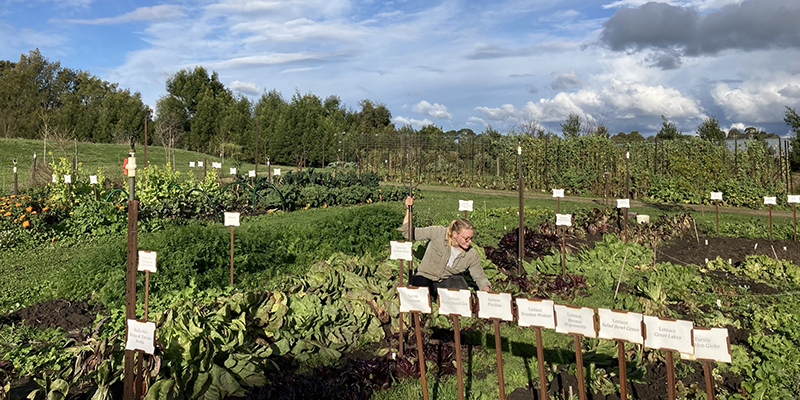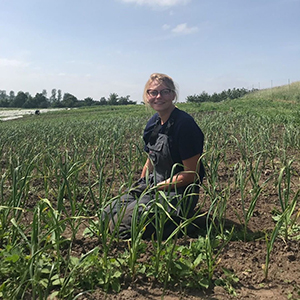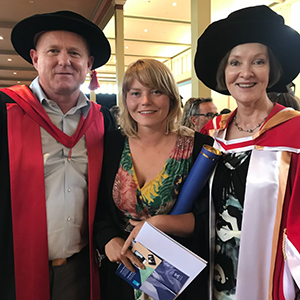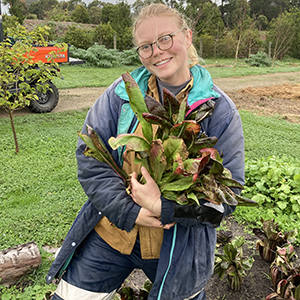Growth in surprising forms for Brae's Head Gardener, Nina Breidahl
Nina Breidahl, Head Gardener at Brae restaurant in Birregurra, Victoria opens up on how a seed of an idea planted during her arts degree at the University of Melbourne flourished into a richly satisfying career.
For most of us, gardening is seldom more than a pleasurable pastime. For Nina Breidahl, it was an act of procrastination – a diversion from her studies as an arts student. But to her surprise, her side-passion took root in an unexpected fashion.
Having transferred her energies into horticultural studies at the University of Melbourne's Burnley campus, her talents have since blossomed in her role as Head Gardener at the highly celebrated Brae, on organic farm-to-table fine dining restaurant in Birregurra, Victoria.

We sat down with Nina to talk about how she found her purpose, why small victories are more satisfying than big successes, and what she's digging in her garden right now.
What is it you do now?
I'm the head gardener at Brae, a farm-to-table fine dining restaurant (about an hour and forty five minutes out of Melbourne). I manage extensive gardens – two fruit orchards, a citrus grove, an olive grove, truffle trees, ornamental gardens, a native food garden, and a fairly sizable market-style veggie garden. We run everything organically and the produce from the garden is then used exclusively by the Brae kitchen to build their dishes, supplemented with produce from other local farms and suppliers.
Is this where you saw yourself?
Never in a million years. I didn't even know this was a job. I only got it because I called to ask if I could do an internship as part of my degree. They said, we don't really do that, but sure. I had zero experience in the field, so even when I made that call, I didn't think they were ever going to say yes.

How did you arrive at horticulture from the arts?
I'm really glad I did my arts degree at the University of Melbourne. It had a great effect on me and was really helpful in letting me explore a whole range of things. But to be honest, I didn't know where I was going. I was a fairly lax student, procrastinating on my course work and filling my time with gardening. Then someone said to me, "Why not focus on the gardening?" And I said, "Of course!" It hadn't occurred to me it could be a viable option. Once I'd made the decision to go on to study at Burnley (the University of Melbourne's horticultural campus near Richmond), it just clicked. I loved being there. I was really invested. Having a goal you're passionate about makes such a difference.
Having made that pivot, can you recall some of the highlights?
Burnley is amazing at teaching you the practical things you might learn at TAFE or on the job but married to very philosophical questions. I had classes that were practical and some that were purely theoretical. It was a really good mix of, "Lets investigate just how sustainable this eco-product is" with "Let's dig in the garden and see how we grow potatoes."
How do you think your experience at the University of Melbourne played a role in what you do today?
Burnley is an incredible place, set within Botanic Gardens and surrounded by trees hundreds of years old. You have so many different examples of how to do what you're doing right there in front of you. It's a small community, full of people who are so passionate.

Were there any lecturers that made a particularly big impression?
Chris Williams and Kirsten Raynor are two University of Melbourne lecturers I love. Chris is really good at marrying the practical with the philosophical – like topics that asked, "How do we interact with the green spaces in our lives?" And Kirsten was terrific at making complex scientific ideas accessible. I felt really engaged by both their teachings. I wanted to go to all of my classes, but those two in particular were really inspiring.
What do you feel are some of your biggest successes since graduating?
I don't really know if my job is about big successes. Mostly, it's small victories. It's having a really tricky crop that's taken several attempts to get right. I've been grappling with Takinogawa Long Burdock recently – a Japanese root vegetable that's not particularly hard to grow. But I've had nothing but trouble with it. After two bad crops, I was finally able to grow a good one this year. And it's a moment of measurable proof that I'm growing and developing. I think all those little incremental successes accumulate into progress. I find those small achievements very satisfying.
What's the one thing that's helped you get where you are today that's not on your CV?
It's a bit corny, but just having a supportive family and a good network – I'm talking about those special people who are there to support you when you need support and to push you when you need to be pushed. I grew up in a household where learning was encouraged. Discussing hard topics around the dinner table was the norm. And I think that has really pushed me to seeking out a slightly unusual path.

What advice would you give to students about to graduate?
I think you should shoot your shot, and don't be afraid that you'll be shot down. I got my position by being in the right place at the right time and asking for it. Obviously, I was privileged to be in a position to ask for it, and to be able to accept it. But I didn't think they were going to say yes. Even if you think there's no way they're going to hire an inexperienced student to work at an award-winning restaurant, sometimes they will.
What's inspiring you in the garden right now?
I have a bad habit of becoming obsessed with one or two crops every season. Right now it's radicchio, and we're growing eight types. It's very sensitive to the timing of planting and harvest. And similar to the burdock I was talking about earlier, I think I've finally nailed it. I'm so excited.
What does success look like for you?
Just to be very simple about it, all I want is to create beautiful, delicious things with as little impact (or preferably a positive impact) on the environment.
What excites you about your future?
Horticulture is a really exciting industry at the moment. We have so many live questions; questions like climate change, food security, food equity and accessibility. I don't know what area I'll ultimately end up in or if it will be relevant to my work. But I'd like it to be. And I do think food production, and green space management more broadly, are going to be such an ongoing, interesting space because of the way the world is at the moment.